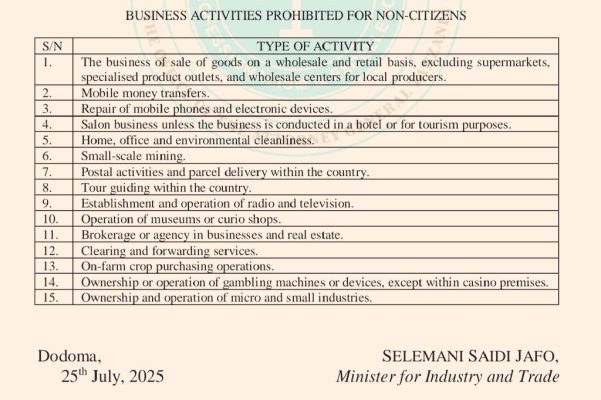
In a sweeping policy shift aimed at protecting local entrepreneurship and curbing rising unemployment, the Tanzanian government has announced a ban on non-citizens including Nigerians, from participating in a wide range of small and medium-scale business activities.
The new directive, titled Business Licensing (Prohibition of Business Activities for Non-Citizens Order) 2025, was signed into law by the Minister for Industry and Trade, Selemani Saidi Jafo, and took effect on July 25, 2025.
“This order is a deliberate step to ensure that sectors traditionally accessible to locals remain preserved for Tanzanians,” Minister Jafo said while unveiling the policy on Monday. “It reflects the government’s broader commitment to economic inclusion and employment for citizens.”
Under the new rules, foreign nationals are barred from engaging in at least 15 business sectors. These include retail trade (except for supermarkets and specialized outlets), mobile phone repairs, mobile money services, home and office cleaning, small-scale mining, hair salons outside hotels, on-farm crop purchasing, and tour guiding.
Licensing authorities are also prohibited from issuing or renewing business licenses for non-citizens in the affected sectors. “Upon coming into effect of this order, licensing authorities shall not issue or renew a licence for a non-citizen to carry out any of the business activities prohibited under this order,” read an official statement from the Ministry of Industry and Trade.
The move comes amid growing complaints from Tanzanian traders, particularly in busy commercial hubs like Kariakoo market in Dar es Salaam, who say they are being pushed out of traditional retail sectors by foreign competitors, most notably Chinese traders.
Local business associations have welcomed the government’s decision. “This is long overdue,” said Neema Mwansasu, a spokesperson for the Tanzanian Retail Traders Union. “Our people have been losing ground in the very businesses that once sustained their families. This measure gives us a fighting chance.”
However, international observers and business stakeholders have raised concerns about the implications for foreign investment and regional trade. “While it’s understandable that governments want to protect local industries, such policies may send the wrong signals to investors and partners,” warned Dr. Chinedu Eze, a Nigerian economist and trade analyst. “This could have ripple effects on bilateral relations, particularly with countries like Nigeria that have significant economic footprints in Tanzania.”
The Ministry has not yet clarified whether exemptions or transitional provisions will be granted to foreign nationals currently operating within the newly restricted sectors.
Tanzania now joins a growing list of African countries—including Nigeria, Ghana, South Africa, Zimbabwe, Zambia, Swaziland, and Botswana, that have implemented similar restrictions to ring-fence key economic activities for their citizens.
The announcement marks a notable shift toward economic nationalism in Tanzania, as the government prioritizes local participation in grassroots commerce over open access for foreign entrepreneurs.



